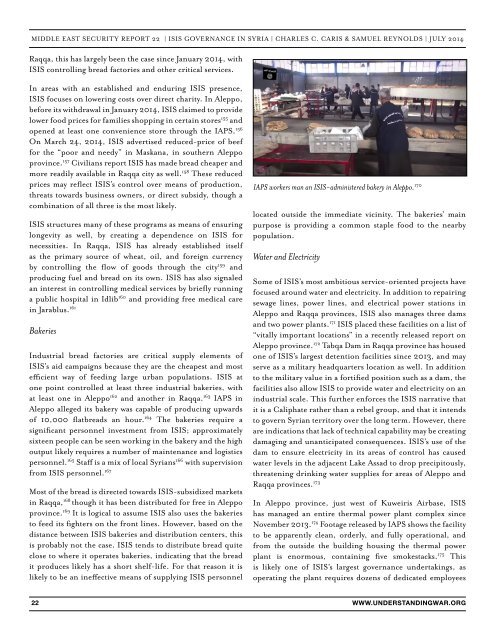ISIS_Governance
ISIS_Governance
ISIS_Governance
Create successful ePaper yourself
Turn your PDF publications into a flip-book with our unique Google optimized e-Paper software.
Middle East Security Report 22 | <strong>ISIS</strong> <strong>Governance</strong> in syria | Charles C. Caris & Samuel Reynolds | july 2014<br />
Raqqa, this has largely been the case since January 2014, with<br />
<strong>ISIS</strong> controlling bread factories and other critical services.<br />
In areas with an established and enduring <strong>ISIS</strong> presence,<br />
<strong>ISIS</strong> focuses on lowering costs over direct charity. In Aleppo,<br />
before its withdrawal in January 2014, <strong>ISIS</strong> claimed to provide<br />
lower food prices for families shopping in certain stores 155 and<br />
opened at least one convenience store through the IAPS. 156<br />
On March 24, 2014, <strong>ISIS</strong> advertised reduced-price of beef<br />
for the “poor and needy” in Maskana, in southern Aleppo<br />
province. 157 Civilians report <strong>ISIS</strong> has made bread cheaper and<br />
more readily available in Raqqa city as well. 158 These reduced<br />
prices may reflect <strong>ISIS</strong>’s control over means of production,<br />
threats towards business owners, or direct subsidy, though a<br />
combination of all three is the most likely.<br />
<strong>ISIS</strong> structures many of these programs as means of ensuring<br />
longevity as well, by creating a dependence on <strong>ISIS</strong> for<br />
necessities. In Raqqa, <strong>ISIS</strong> has already established itself<br />
as the primary source of wheat, oil, and foreign currency<br />
by controlling the flow of goods through the city 159 and<br />
producing fuel and bread on its own. <strong>ISIS</strong> has also signaled<br />
an interest in controlling medical services by briefly running<br />
a public hospital in Idlib 160 and providing free medical care<br />
in Jarablus. 161<br />
Bakeries<br />
Industrial bread factories are critical supply elements of<br />
<strong>ISIS</strong>’s aid campaigns because they are the cheapest and most<br />
efficient way of feeding large urban populations. <strong>ISIS</strong> at<br />
one point controlled at least three industrial bakeries, with<br />
at least one in Aleppo 162 and another in Raqqa. 163 IAPS in<br />
Aleppo alleged its bakery was capable of producing upwards<br />
of 10,000 flatbreads an hour. 164 The bakeries require a<br />
significant personnel investment from <strong>ISIS</strong>; approximately<br />
sixteen people can be seen working in the bakery and the high<br />
output likely requires a number of maintenance and logistics<br />
personnel. 165 Staff is a mix of local Syrians 166 with supervision<br />
from <strong>ISIS</strong> personnel. 167<br />
Most of the bread is directed towards <strong>ISIS</strong>-subsidized markets<br />
in Raqqa, 168 though it has been distributed for free in Aleppo<br />
province. 169 It is logical to assume <strong>ISIS</strong> also uses the bakeries<br />
to feed its fighters on the front lines. However, based on the<br />
distance between <strong>ISIS</strong> bakeries and distribution centers, this<br />
is probably not the case. <strong>ISIS</strong> tends to distribute bread quite<br />
close to where it operates bakeries, indicating that the bread<br />
it produces likely has a short shelf-life. For that reason it is<br />
likely to be an ineffective means of supplying <strong>ISIS</strong> personnel<br />
IAPS workers man an <strong>ISIS</strong>-administered bakery in Aleppo. 170<br />
located outside the immediate vicinity. The bakeries’ main<br />
purpose is providing a common staple food to the nearby<br />
population.<br />
Water and Electricity<br />
Some of <strong>ISIS</strong>’s most ambitious service-oriented projects have<br />
focused around water and electricity. In addition to repairing<br />
sewage lines, power lines, and electrical power stations in<br />
Aleppo and Raqqa provinces, <strong>ISIS</strong> also manages three dams<br />
and two power plants. 171 <strong>ISIS</strong> placed these facilities on a list of<br />
“vitally important locations” in a recently released report on<br />
Aleppo province. 172 Tabqa Dam in Raqqa province has housed<br />
one of <strong>ISIS</strong>’s largest detention facilities since 2013, and may<br />
serve as a military headquarters location as well. In addition<br />
to the military value in a fortified position such as a dam, the<br />
facilities also allow <strong>ISIS</strong> to provide water and electricity on an<br />
industrial scale. This further enforces the <strong>ISIS</strong> narrative that<br />
it is a Caliphate rather than a rebel group, and that it intends<br />
to govern Syrian territory over the long term. However, there<br />
are indications that lack of technical capability may be creating<br />
damaging and unanticipated consequences. <strong>ISIS</strong>’s use of the<br />
dam to ensure electricity in its areas of control has caused<br />
water levels in the adjacent Lake Assad to drop precipitously,<br />
threatening drinking water supplies for areas of Aleppo and<br />
Raqqa provinces. 173<br />
In Aleppo province, just west of Kuweiris Airbase, <strong>ISIS</strong><br />
has managed an entire thermal power plant complex since<br />
November 2013. 174 Footage released by IAPS shows the facility<br />
to be apparently clean, orderly, and fully operational, and<br />
from the outside the building housing the thermal power<br />
plant is enormous, containing five smokestacks. 175 This<br />
is likely one of <strong>ISIS</strong>’s largest governance undertakings, as<br />
operating the plant requires dozens of dedicated employees<br />
22 www.Understandingwar.org


